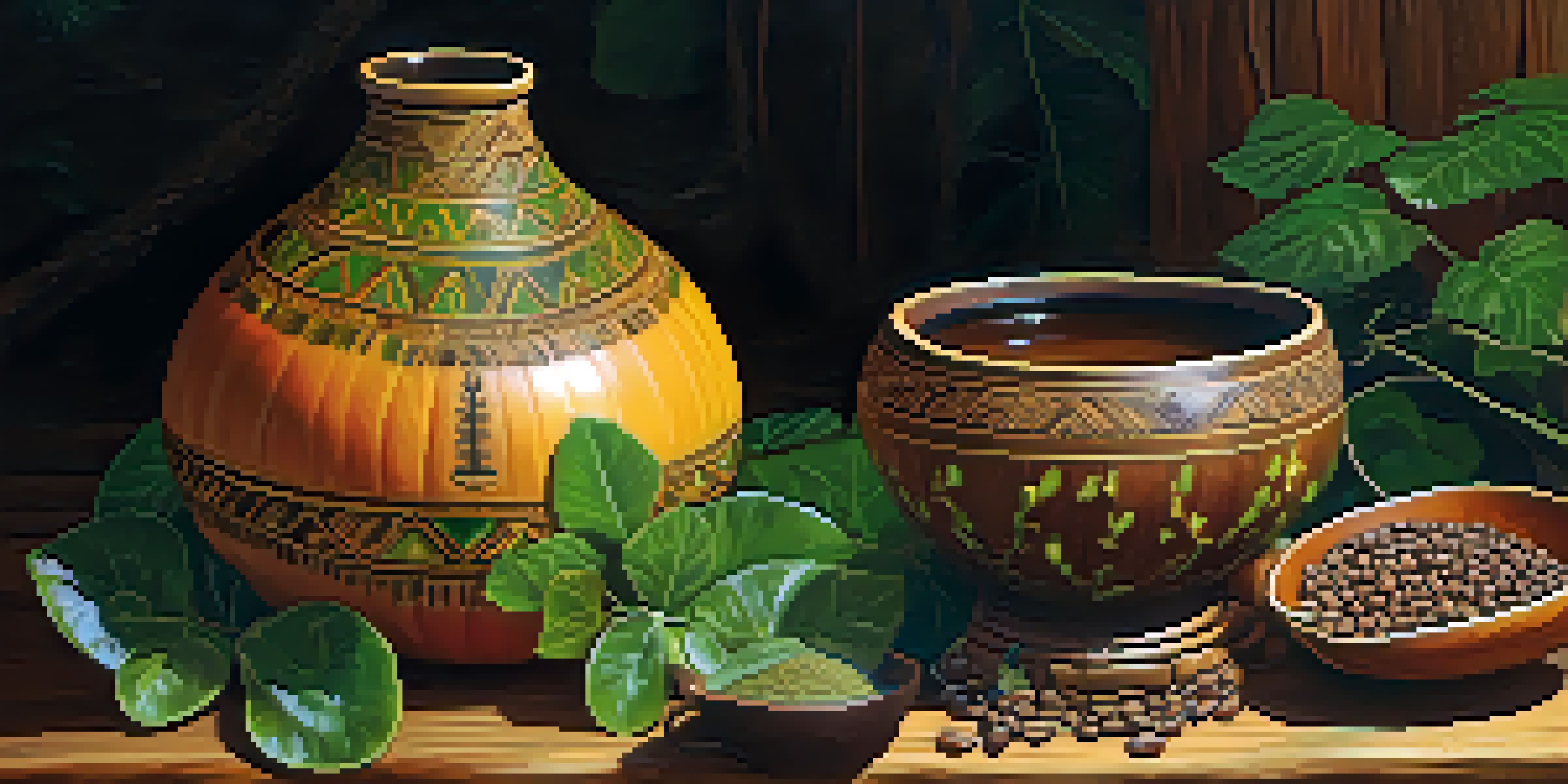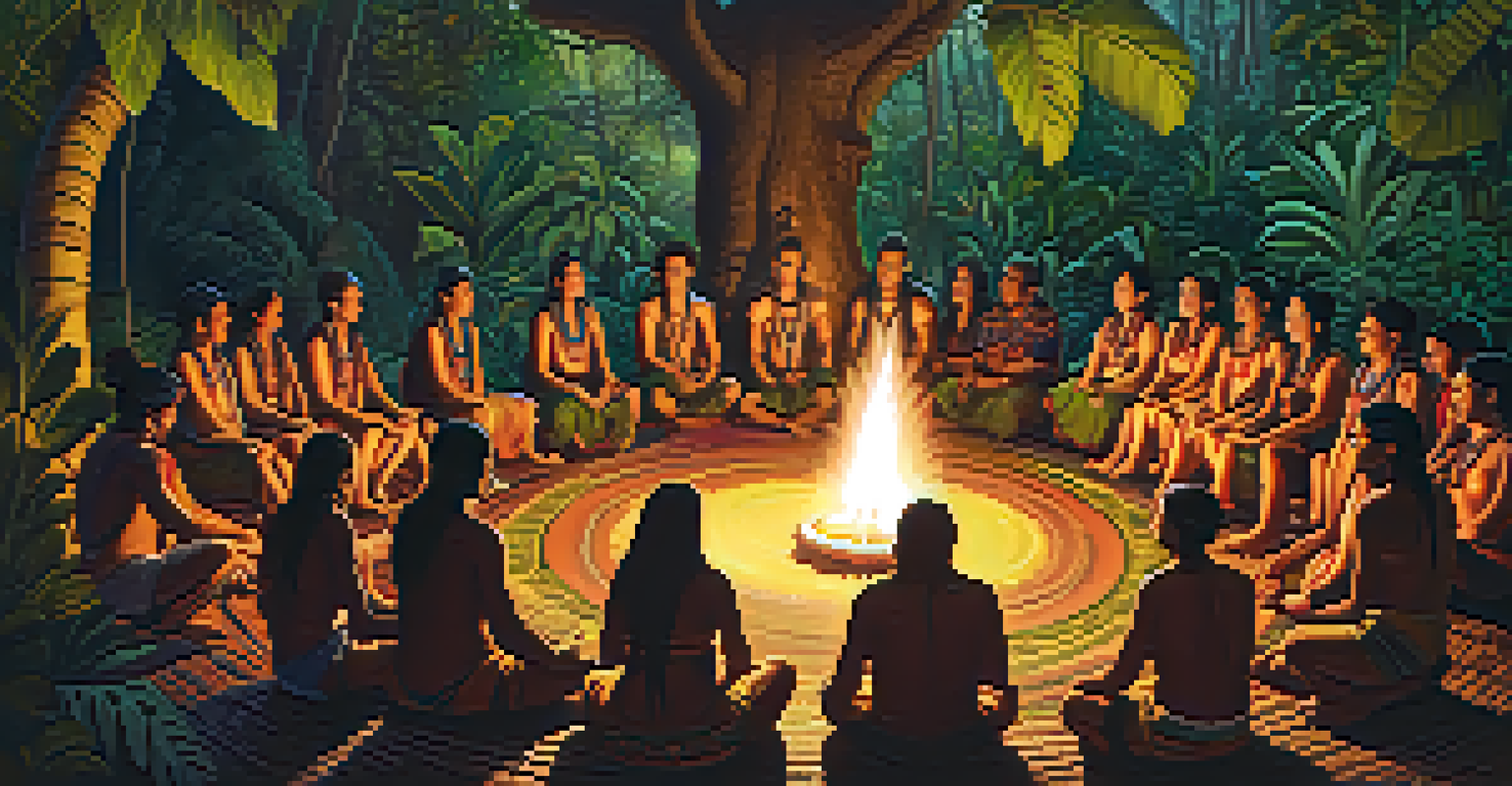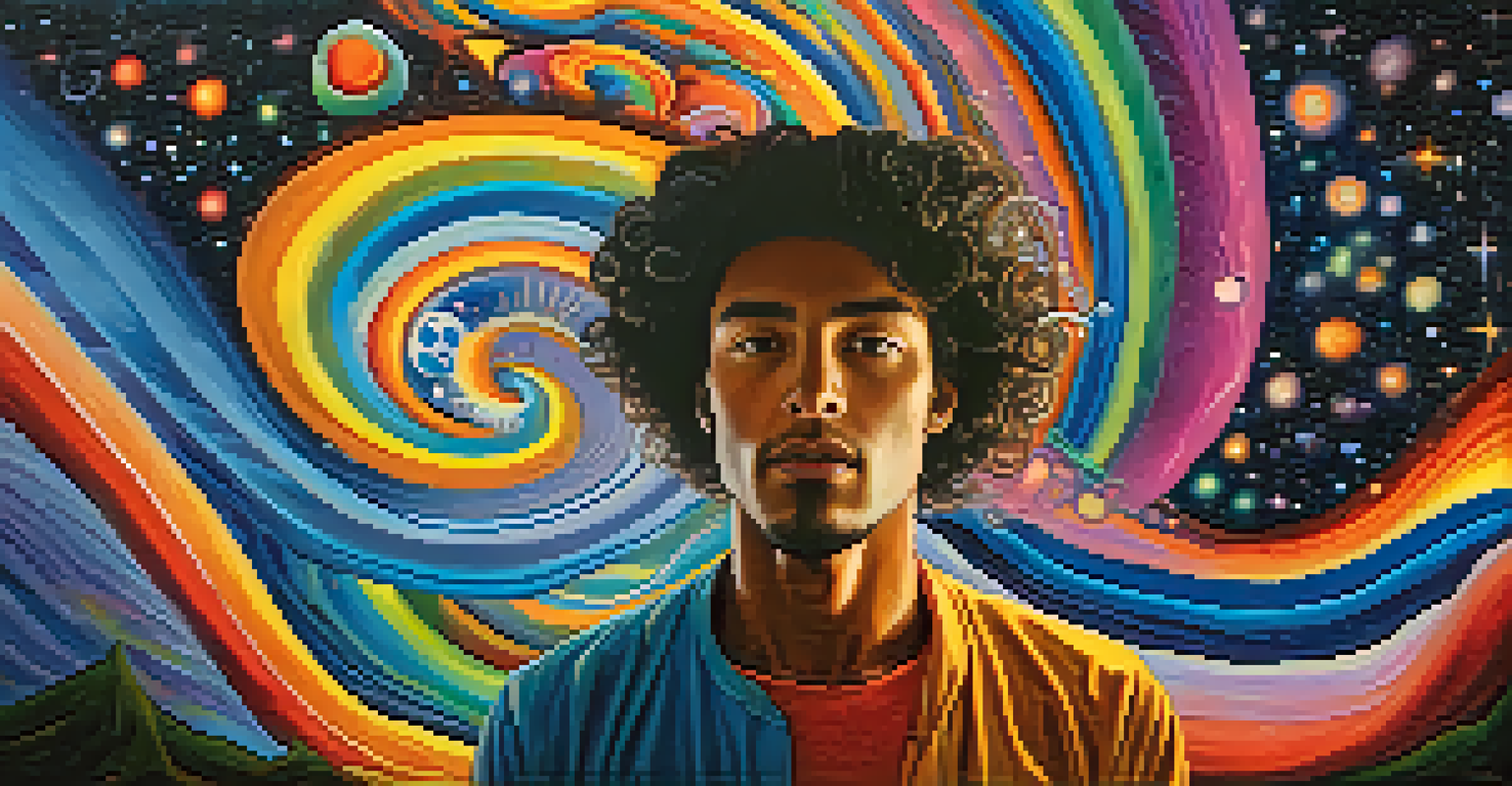Cultural Perspectives on Ayahuasca and Spiritual Growth

Understanding Ayahuasca: A Cultural Overview
Ayahuasca, a powerful plant medicine, has deep roots in South American indigenous cultures. Traditionally, it is brewed from the Banisteriopsis caapi vine and other plants, creating a hallucinogenic drink used in spiritual ceremonies. These rituals often aim to foster healing, insight, and a connection to the spiritual world, showcasing the profound cultural significance of ayahuasca.
The experience of ayahuasca is not merely about the visions; it's about the healing that follows, the integration into everyday life, and the understanding of oneself in the universe.
In many indigenous communities, ayahuasca is more than just a substance; it’s a sacred tool for guidance and transformation. The ceremonies are led by shamans or healers who have undergone years of training to use the medicine responsibly. This cultural context highlights how ayahuasca is intertwined with identity, tradition, and communal healing practices.
As interest in ayahuasca grows globally, it's essential to approach it with respect for these traditions. Misunderstanding or trivializing its cultural roots can lead to appropriation and disrespect. Recognizing its significance opens up a deeper appreciation for the spiritual journeys it facilitates.
Spiritual Growth: Ayahuasca's Transformative Power
Many individuals who participate in ayahuasca ceremonies report profound experiences that contribute to their spiritual growth. The drink often induces vivid visions and emotional breakthroughs, allowing participants to confront personal traumas and gain insights into their lives. This process can lead to a sense of clarity and purpose that many seek in their spiritual journeys.

For many, the experience is akin to peeling back layers of the self, revealing hidden fears and desires. As participants navigate these intense emotional landscapes, they often emerge with a renewed sense of self and a deeper understanding of their place in the universe. This transformative aspect of ayahuasca is what draws many to explore its spiritual potential.
Cultural Significance of Ayahuasca
Ayahuasca is a sacred tool for healing and spiritual growth deeply embedded in indigenous traditions.
However, it’s important to note that spiritual growth through ayahuasca is not a guaranteed outcome. Each individual's experience can vary widely, and not everyone will find the same level of insight. This variability underscores the importance of approaching the experience with an open mind and a willingness to embrace whatever arises.
The Role of Shamans in Ayahuasca Ceremonies
Shamans play a crucial role in the ayahuasca experience, guiding participants through their journeys. They are considered custodians of ancient knowledge, using chants, songs, and rituals to create a safe environment for exploration. Their guidance helps participants navigate the often challenging emotional terrain that ayahuasca can reveal.
Ayahuasca is a tool for growth and healing, but it requires respect for its cultural roots and a commitment to ethical practices.
In addition to offering support, shamans also curate the experience by carefully selecting the right blend of plants and ensuring that the ceremony aligns with traditional practices. This respect for the medicinal properties of ayahuasca adds a layer of authenticity to the spiritual experience. Many participants find comfort in knowing they are in the hands of someone who understands the intricacies of the journey.
The relationship between the participant and the shaman can also foster a sense of community and connection. This communal aspect is vital, as it allows individuals to share their experiences, further enriching their spiritual growth. The shared journey can create bonds that last long after the ceremony ends.
Cultural Misappropriation and Ethical Considerations
As ayahuasca gains popularity outside of its traditional contexts, concerns about cultural appropriation have emerged. Many indigenous peoples express frustration over the commercialization of ayahuasca ceremonies, where the essence of the practice is often diluted. This raises ethical questions about who has the right to use these sacred traditions and for what purposes.
It’s essential for those interested in exploring ayahuasca to do so with a mindset of respect and understanding. Engaging with indigenous communities and learning from their perspectives can help bridge the gap between cultures. Acknowledging the origins of ayahuasca and its intended use can lead to more respectful and authentic experiences.
Role of Shamans in Ceremonies
Shamans guide participants through ayahuasca experiences, ensuring safety and respect for cultural practices.
Additionally, promoting ethical practices within the ayahuasca tourism industry is crucial. This includes ensuring that shamans are fairly compensated and that ceremonies are conducted with integrity. By prioritizing ethical considerations, participants can contribute to a more sustainable and respectful relationship with ayahuasca traditions.
Scientific Perspectives on Ayahuasca and Spirituality
The growing interest in ayahuasca has also caught the attention of scientists and researchers. Studies suggest that ayahuasca may have therapeutic benefits, particularly in treating conditions such as depression and PTSD. These findings add a layer of legitimacy to the spiritual experiences reported by participants, as they highlight the potential for healing through this powerful plant medicine.
Research into the effects of ayahuasca often focuses on its chemical components, particularly DMT (dimethyltryptamine). DMT is known for inducing altered states of consciousness, which can facilitate deep introspection and emotional healing. Understanding the biochemical aspects of ayahuasca can provide insight into why so many individuals report transformative experiences.
However, it’s essential to balance scientific inquiry with respect for the cultural practices surrounding ayahuasca. While research can validate the experiences of participants, it should not overshadow the rich traditions from which ayahuasca originates. Emphasizing both scientific and cultural perspectives can lead to a more holistic understanding of ayahuasca's role in spiritual growth.
Personal Stories: Ayahuasca and Individual Journeys
Many individuals who have undergone ayahuasca ceremonies share powerful personal stories that illustrate the depth of their experiences. These narratives often highlight moments of clarity, healing, and profound connection to the universe. For many, these journeys serve as pivotal turning points in their lives, influencing their spiritual paths for years to come.
One common theme in these stories is the feeling of interconnectedness with all living beings. Participants often describe a sense of unity that transcends the individual self, fostering a deeper appreciation for life and a commitment to positive change. These experiences can inspire individuals to engage more fully with their communities and the world around them.
Integration of Insights Post-Ceremony
Participants face challenges in incorporating their ayahuasca insights into daily life, emphasizing the need for ongoing growth.
However, not all stories are about enlightenment; some individuals face challenging emotions and difficult realizations. These tough moments can be just as transformative, pushing participants to confront their shadows and encouraging personal growth. The diverse range of experiences underscores the complexity of ayahuasca as a tool for spiritual exploration.
Integrating Insights: Life After Ayahuasca
After an ayahuasca ceremony, many participants find themselves grappling with how to integrate their insights into everyday life. The challenges of returning to the 'normal' world can be significant, as the profound experiences can feel overwhelming. Finding ways to incorporate newfound wisdom into daily routines is essential for maintaining the benefits of the journey.
Some individuals choose to engage in practices like meditation, journaling, or therapy to help process their experiences. These tools can facilitate the integration of insights gained during the ceremony and support ongoing spiritual growth. Community support can also play a vital role, as sharing experiences with others can foster a sense of belonging and understanding.

Ultimately, the journey doesn’t end with the ceremony; it’s just the beginning of a new chapter. By embracing the lessons learned and remaining committed to personal growth, individuals can cultivate a richer, more meaningful life. This ongoing process reflects the true spirit of ayahuasca, which is about continual exploration and evolution.